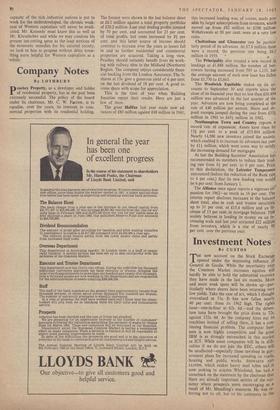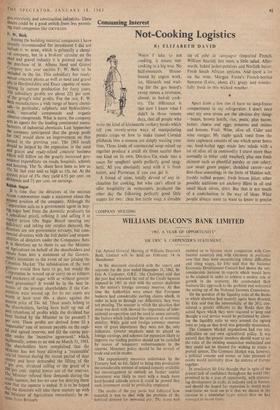Investment Notes
By CUSTOS
THE new account on the Stock Exchange opened under the depressing influence of General de Gaulle. While the uncertainty over the Common Market increases equities will hardly be able to hold the substantial recovery they have made in the last six months. More and more weak spots will be shown up—par- ticularly where shares have been returning very low yields. Take the case of ICT, which I thought overvalued at 71s. It has now fallen nearly 40 per cent. from its 1962 high. The rights issue—one-in-four at 62s. 6d.—and the deben- ture issue have brought the price down to 72s. against 122s. 6d. As the company hires out its machines instead of selling them, it has a con- tinuing financial problem. The computer busi- ness is now highly competitive and the great IBM is as strongly entrenched in this market as ICT. While some companies will be in diffi- culties if we do not join the EEC, others will be unaffected—especially those involved in gov- ernment plans for increased spending on roads, housing and public works. STEWARTS AND LLOYDS, which makes heavy steel tubes and is now seeking to acquire Whitehead, has had a comeback on the statement by the chairman that there are already important sectors of the eco- nomy where prospects seem encouraging as a result of Mr. Maudling's measures. He was re- ferring not to oil, but to his customers in the gas, electricity and construction industries.• These shares could be a good switch from less promis- ing steel companies like COLVILLES.
P. W. Berk
Among the building material companies I have recently recommended for investment I did not
include v. W. BERK, which is primarily a chemi- cal company, but in a brokers' circular on the sand and gravel industry it is pointed out that the purchase of St. Albans Sand and Gravel Company last year entitles F. W. Berk to be included in the list. This subsidiary has ready- mixed concrete plants as well as sand and gravel pits in Hertfordshire and Essex capable of main-
taining current production for forty years. The subsidiary profits are about 221 per cent. of the group's total profits. For the rest, F. W. Berk manufactures a wide range of heavy chemi- cals-- in particular, sulphuric and hydrochloric acids, mercurial compounds and organic chlorine compounds. What is more, the company acts as agents for the leading continental manu- facturers of industrial chemicals. Last September the company anticipated that the group profit for 1962 would show an improvement on that earned in the previous year. The 1963 result should be helped by the expansion in the sand and gravel and ready-mixed concrete business Which will follow on the greatly increased gov- ernment expenditure on roads, hospitals, schools and housing. The 5s. share have been as low as 1 I s. 3d. last year and as high as 15s. 6d. At the Present price of 15s. they yield 4.55 per cent. on dividends and 71 per cent. on earnings.
111 elfish Sugar It is time that the directors of the BRITISH SUGAR CORPORATION made a statement about the Present position of the company. Although the (2. orporation acts as a government agent in buy- ing sugar beet from the domestic producers (at 4 subsidised price), refining it and selling it at rni.yket prices (the Sugar Board meeting any tit!. Peiency and taking any surplus thereon), the nuectors are not government servants, but com- mercial directors with the full dutieeand respon- sibilities of directors under the Companies Acts. It is therefore up to them to see the Minister of Agriculture on behalf of the shareholders and Obtain from him a statement of the Govern- ment's intentions in the event of our joining the Common Market. The subsidisation of the beet growers would then have to go, but would the CerPoration be wound up or carry on as refiners and marketers of sugar with or without govern- ment guarantees? It would be in the best in- terests of the present shareholders if the Cor- poration were wound up, for its net assets are Worth at least over 60s. a share, against the Present price of 24s. 6d. These assets belong to the shareholders, having been built up out of Past retentions of profits while the dividend has been limited by the Minister to (at present) 7 Per cent. These profits are derived from (i) a reasonable' rate of interest payable on the capi- tal and agreed reserves, and (ii) the extras pay- "hie under the 'incentive agreement,' which, incidentally, comes to an end on March 31, 1963. The shareholders have complained that the Minister has not been allowing a 'reasonable' rate of interest during the recent period of dear money and have demanded the lifting of the
-,
Per cent. dividend ceiling or the grant of a 100 per cent. capital bonus out of the reserves. The Minister refused these demands during the credit squeeze, but has no case for denying them new that the squeeze is ended. It is to be hoped that the directors will take these matters up with tile Minister of Agriculture immediately he re- turns from Brussels.































 Previous page
Previous page